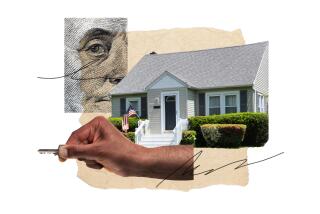Study Finds Homeowner Racial Gap
The number of Americans who own their homes is at a historic high, yet there remains a persistent gap in homeownership that runs along racial lines, a study released Wednesday found.
Despite a host of government and industry initiatives to help minorities buy their first home, a much larger percentage of whites hold title to their residences than do blacks or Latinos, according to research done by USC’s Lusk Center for Real Estate.
The difference in homeownership rates -- about 75% for whites, compared with about 50% for blacks and Latinos as recently as last year -- has remained fairly steady for the last 18 years, the study found.
The reason for the disparity has less to do with accessing credit than with perennial socioeconomic circumstances: How much money people make and their education level are greater factors in influencing whether they own a home.
“At the end of the day, what this analysis tells us is that these gaps, to an overwhelming extent, are determined by income differentials,” said Stuart Gabriel, director of the Lusk Center and co-author of the study.
The data, Gabriel said, also suggest that policymakers “will need to look beyond innovations in mortgage finance if their goal is to further expand homeownership.”
The government and the housing industry have been working to raise the homeownership aspirations of Americans in recent years. New types of home loans -- including some that require no money down -- relaxed underwriting standards, expansion of the secondary mortgage market and low interest rates have combined to push homeownership levels higher for all groups since 1983. But, according to Gabriel, these measures did little to narrow the chasm between white homeowners and minorities.
A better, long-term strategy for increasing homeownership among minorities is to set broad societal goals that would “build human capital” through investing in educational opportunities and job training, Gabriel said.
“As upward economic mobility moves forward, so will homeownership,” he said.
Minorities have had an easier time qualifying for home loans in recent years, but they tend to be charged more for mortgage services, sometimes putting them off a home purchase, said Kevin Stein, a leader of the California Reinvestment Coalition.
“It used to be that our concerns were whether the underserved community would have access to credit,” Stein said. “Now there is a newer issue in how costly it is.”
Gabriel and Stuart Rosenthal of Syracuse University’s Center for Policy Research analyzed data from the Federal Reserve’s Survey of Consumer Finances, a triennial survey of the balance sheet, pension, income and other demographic characteristics of U.S. families. The data spanned 18 years, from 1983 to 2001.
Buried in the statistics, Gabriel said, was a positive trend: The number of black and Latino renters saving to buy a home more than doubled in the last two decades. That suggests closing the ownership gap is attainable, he said.
A fifth of Latino renters and 16% of African American renters say they are socking away money for a house. That’s a big jump from 1983, when only 8.5% of Latino renters and 6.8% of blacks were saving to purchase a home, according to the USC research.
“It’s a very hopeful sign about future improvements in homeownership rates,” Gabriel said.
Indeed, progress seems to be underway, said Terri Parker, executive director of the California Housing Finance Agency, a quasi-public entity that assists first-time home buyers. Her agency has seen its lending to minorities rise every year for at least the last five years, and now about two-thirds of the 37,000 home loans in its portfolio are to minority borrowers.
“Minorities are the target sector of the population for first-time home buyer programs because they are viewed by the industry as the largest pool of the age group that typically would be buyers,” Parker said.
One of the biggest industry players on Wednesday sought to further capitalize on the drive for minority homeownership. Title insurance giant First American Corp., along with Microsoft Corp.’s MSN online service, launched a personal finance Internet portal called Finanzas to provide Spanish speakers with information about home buying, loan and credit counseling and other financial services.
“We have tools to deal with barriers to homeownership,” First American Vice President Landon Taylor said, “but not enough people know about it.”
More to Read
Inside the business of entertainment
The Wide Shot brings you news, analysis and insights on everything from streaming wars to production — and what it all means for the future.
You may occasionally receive promotional content from the Los Angeles Times.










